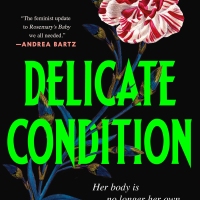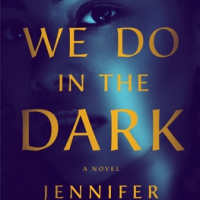Book Review: The Chimes by Anna Smaill
A review copy was provided by the publisher in exchange for an honest review. All opinions are my own.
Mogsy’s Rating: 3.5 of 5 stars
Genre: Fantasy, Dystopian
Series: Stand Alone
Publisher: Quercus (US: May 3, 2016)
Length: 304 pages
Author Information: Website | Twitter
Lately, several books have made me think a lot harder about the collective memory of humanity and this one is the most recent. What if we lost that memory, or something happened to prevent us from remembering? What if we lost the ability to record our memories and knowledge for posterity?
In Anna Smaill’s The Chimes, this is the reality for our young protagonist Simon. Orphaned and alone, with only vague instructions from his late mother to locate someone named “Netty”, he arrives in London feeling as lost as he could ever be. In the aftermath of a brutal civil war, the London in this alternate world has been transformed into a divided city. Most of its citizens do their best to eke out a modest existence, while the poor live in squalor in the slums. Only a select few are chosen and taken into the walls of The Order’s sanctuary where they stay for the rest of their lives, receiving the best schooling and learning how to compose the beautiful music played throughout the city every morning and night. These are known as the chimes, the songs that suppress the memories of the people of London—because a population that forgets is one that can be easily controlled and contained.
Simon quickly discovers that his task is hopeless. No one is willing to help, and in any case, he can do no more with only a half-remembered promise. Soon, however, he crosses into the territory of a gang of street urchins who end up taking him in, teaching him how to scavenge for the precious metals valued by The Order. This is how Simon meets Lucien, the group’s blind and charismatic young leader.
After a while though, Simon no longer recalls what it was that brought him to London in the first place. Still, like most people in this world, he carries a bag of trinkets and baubles associated with memories that might help anchor him to the past. Handling these objects allows a person to remember, even if it’s just for a short while. Gradually, Simon realizes he is starting to remember things, more and more and from longer ago. He remembers his mother, and the talent that she may have passed on to him. Together with Lucien, whom Simon grows to care for and love, the two of them prepare for a journey to fulfill a promise and to find out more about Simon’s gift.
Smaill has created a wonderful atmosphere in this book. In keeping with the novel’s themes, starting the first few pages of The Chimes felt uncannily like stepping into a kind of fugue state. At first it was hard to figure out what was going on, much like waking up to your surroundings to discover that you have no idea where you are, but your senses detect things that feel vaguely recognizable and familiar. For instance, we are told that we’re in London, but the descriptions of the city and its people feel completely strange and alien. Then there are the made-up words that pepper the narrative, and yet their meanings can often be gleaned from the more common words used to form them. Here and there, musical terms also replace certain adverbs. The list of such dissociations go on and on, which gives this book an almost dreamlike quality. It made getting into the story more challenging than most, I confess, but eventually the fog did clear as more of the world was revealed, and I was able to piece together the novel’s premise.
As you can probably guess from the book’s description, music also plays a huge role in The Chimes, no doubt inspired by Smaill’s own background as a professional musician and violinist. In this world where writing has been banned and the people no longer remember how to read, memories are lost shortly after they are formed, spirited away by the sound of the chimes every morning and evening. But music isn’t the enemy, merely a tool used by the oppressors. In fact, it has multiple other purposes, the foremost of which is to serve as another kind of language. Messages are sung, instructions or maps to places are given in a series of tunes, and as mentioned before, some words are replaced with terms used in musical direction—forte for loud or subito for quick, for example—and clever musical allusions are given to created words like “dischord” or “blasphony”.
The world of The Chimes is also one of the most fascinating and original dystopians I’ve ever encountered. Simply by suppressing the people’s memory, the elites are able to stay in power. However, everyone is aware that memory is important, as evidenced by smalls acts like the carrying around of bags filled with “objectmemory”. Losing that connection is like being lost and untethered, a terrible condition called being “memoryless” that puts fear into people’s hearts.
In the vein of world-building though, I do wish there had been a little more. In spite of the unique concepts described in this book, the details behind them are rather simplistic. Character development was also a bit sparse, though this may have something to do with the fact that Simon spends much of the book trying to piece together his memories and it’s admittedly tough to connect with a protagonist whose sense of self isn’t even entirely complete. In addition, while the prose is gorgeous, there is an abstractedness to it that may pose an obstacle for some. The writing style was what initially tripped me up, though in the end I was able to fall into the rhythm, but it did take me some time to get there.
All told, The Chimes is a novel that may require a bit of patience—but the payoff is worth it. It’s a lovely book with an unusual but spellbinding premise, and readers looking for a different kind of dystopian novel may want to take a look, especially if you have a musical background or a fondness for interesting ways to portray music in fiction. A beautiful story full of imagination and feeling.
![]()
![]()













It sounds different, in the aspect that most dystopia tend to be quite you know
LikeLike
Yes, relative to a lot of dystopians on store shelves today, it’s very different!
LikeLike
It sounds quite confusing at first but also very different
LikeLike
It took a while to get with the rhythm (pardon the pun!)
LikeLike
Nice review, Mogsy. The Chimes had crossed my social-media path recently… I don’t remember where, but it sounds interesting enough. Musical angles always draw my interest, too, and I don’t think I’ve come across a music-centric dystopian book before.
LikeLike
The music element was what drew my attention too. I’m not very musical, I’m afraid…but I do like reading about it and seeing the ways authors can incorporate it into SFF!
LikeLiked by 1 person
Sounds fascinating: we are the sum of our memories, indeed, so I think that this premise about stripping memories from people to empty and control them would make for an intriguing story, even though it requires some “work” on the reader part. After all, facing a challenge is part of the fun, isn’t it? 🙂
LikeLiked by 1 person
Haha, it depends I guess 😉 I’ve certainly had “challenges” that make me want to hurl a book across the room, but thankfully this was not one of them, lol! It’s so satisfying when the payoff is high.
LikeLike
Wow, it’s been a while since a dystopian novel really caught my eye but this sounds very thought-provoking. Alter peoples’ memories or otherwise controlling their minds somehow is – in my opinion – one of the scariest “abilities” or types of magic in fiction. Plus I’m a former band geek, so those musical references will probably pull me in! 🙂
LikeLike
I was actually thinking of you when I was reading this book, since I know you’re a music geek 😀
LikeLike
I always find it interesting when an author pulls in another art form or interest into their stories. Often seems like when it’s something they are passionate about it feels to have a it more depth to it.
LikeLike
Definitely. Fascinating too, to see how they express their love of a hobby into prose or a story.
LikeLike
Pingback: Mogsy’s Bookshelf Roundup: Stacking the Shelves & Recent Reads | The BiblioSanctum
Every time I read a synopsis of this book, I want to pick it up! It has been on my Kindle for almost a year now and I still have yet to start it… The concept of the story sounds fascinating and the fact that it was longlisted for the Man Booker prize even if it was first marketed as YA intrigue me.
LikeLike
LOL yeah it’s been out in the UK for a while, but believe it or not I didn’t even hear of it until earlier this year! I love discovering new literary SFF.
LikeLike